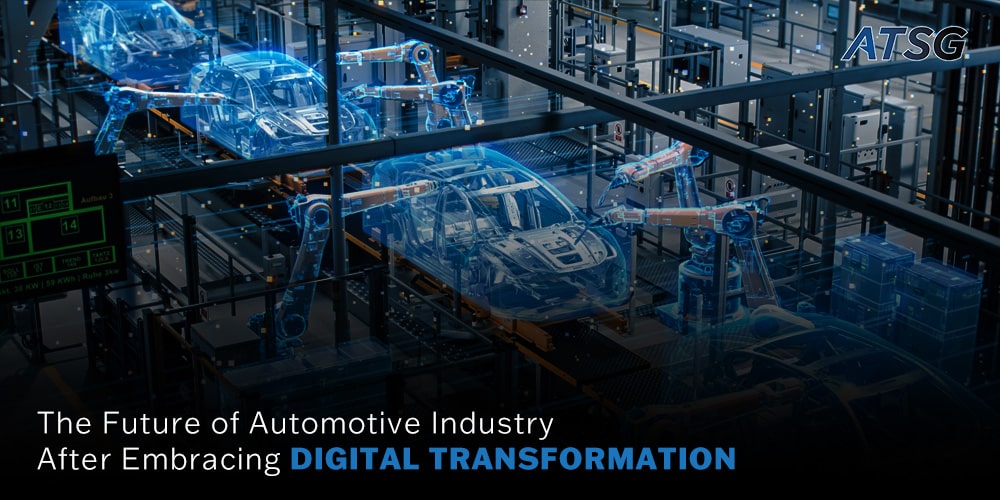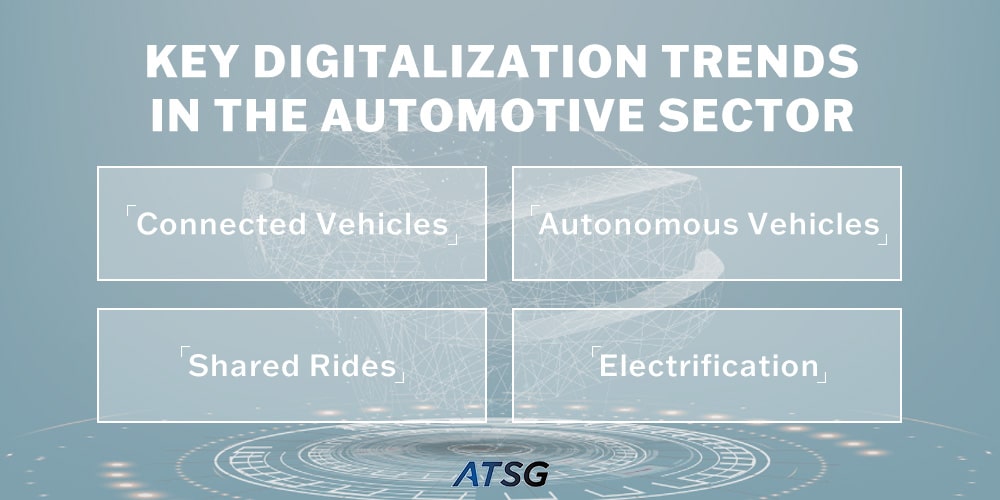The emergence of new digital technologies is greatly impacting our daily lives. Ideas that were once considered futuristic are now becoming a reality. The digital transformation revolution is sweeping across industries worldwide, including the automotive sector. Despite the initial hurdles and challenges of digital transformation, the benefits are undeniable, and the industry is embracing this change with open arms.

The automotive industry is experiencing a profound transformation, driven by digital innovations that are transforming traditional business models. Digitalization is changing the future of the industry, from the rise of self-driving cars and shared mobility models, to custom insurance contracts, remote diagnostics, and predictive repair services.
In this article, we will explore the role of digital transformation in the automotive industry, and how it is driving innovation and growth.
Key Digitalization Trends in the Automotive Sector
The automotive industry is undergoing a major transformation, mainly as a result of changing customer needs, evolving technologies, connectivity, and environmental regulations. To stay ahead of the curve, automotive manufacturers must shift towards a completely digitized and connected factory or assembly floor.
Research shows that the following four trends are disrupting the industry:

Connected Vehicles
Connected vehicles are now expected to offer the same level of connectivity as smartphones, laptops, and other tech devices. This means that everything, from engineering to the factory floor, must have a digital technology component.
Autonomous Vehicles
Self-driving or autonomous vehicles are all about the passenger experience. This demands extra attention at the product design stage. Reliability will also be a key factor, and there is an opportunity for automotive companies to develop new business models.
Shared Rides
Shared rides or shared cars are becoming more popular, and young consumers are now less motivated to own a car. Automotive companies must grow market share in ride-sharing platforms, to retain customers and maintain brand loyalty.
Electrification
The electrification of cars is a disruptive trend that is continuing to evolve, with Europe leading the way. Electric vehicles generate terabytes of data each time they are driven, and manufacturers can use this data to optimize operations, and make the manufacturing process more efficient.
Case Studies of Automotive Sector Growth via Digitalization
The following three examples are of major automotive and manufacturing companies that have led the markets for decades.
Mercedes-Benz Group
Mercedes is integrating complex machinery with networked sensors to create the next generation of production processes. They are using big data and analytics to reduce manufacturing costs, improve the delivery of new products, and manage supply chains and customer mandates. Mercedes-Benz is already deploying an in-memory platform that allows it to analyze large volumes of data in real-time, resulting in faster insights and more efficient production.
Volvo Group
The transport and logistics sector is now following the lead of other industries, and using digitalization to minimize the time to market. Customers are demanding more efficient ways of working, and want to benefit from digitalization. Volvo’s smart algorithms optimize each transport, based on environmental perspective, price, or lead time, while the process is controlled automatically for greater business value.
BMW Group
Car manufacturer BMW Group has implemented big data analytics to enhance the customer experience. They collect data from dealerships and manufacturing outlets worldwide, including 15,000 data points from proto-type cars. With this data, vulnerabilities can be detected and fixed during the manufacturing process, resulting in higher-quality cars and increased customer satisfaction. BMW Group’s use of big data analytics allows for faster analysis and quicker repairs, ultimately saving customers time and money
Future of the Automotive Industry and Digitalization
Automotive manufacturers should follow technology innovators and digitize their entire manufacturing process. Studies show that during the year 2022, nearly 24% of automobile plants have already been converted to smart factories.
49% of automakers have already invested more than USD $250 million in these factories. Despite this, only a few companies have achieved good results, because 42% of smart factory initiatives face challenges due to below-par digital maturity in manufacturing operations.
To overcome this challenge, automotive companies must act fast and enhance the customer experience. Accelerating digital transformation is essential to drive real change, before it’s too late. By doing so, automotive companies can move beyond point solutions, drive real digital strategies, and make smarter, data-driven decisions around automotive production and operations, ensuring vehicle quality and safety.
Managed Service Providers (MSPs) – The Ideal Way to Digital Transformation
Opting to transform digitally is no easy task for any industry. The concept of an MSP can be a highly effective step towards that. ATSG has been one of the globally recognized Managed Service Providers (MSPs), with a highly diversified Service Offerings Portfolio (SOP).
Many industries, including the automotive sector, have migrated towards cloud solutions. ATSG promotes the concept of illustrating innovative and diverse methods to achieve digital transformation. Our Design and Implementation Services enable automotive companies to design highly efficient assembly floors and operations, by fully leveraging digital technologies.
ATSG’s Site and Field services can help automotive businesses with seamless operations and processes, making it an efficient experience altogether. ATSG’s Remote Infrastructure Management (RIM) capabilities can help with managing the performance and efficiency of an automobile manufacturing company’s entire IT infrastructure.
Contact ATSG for further information on our service offerings, spanning across Managed IT Services, Cloud Computing, Technology, and Cybersecurity solutions.




